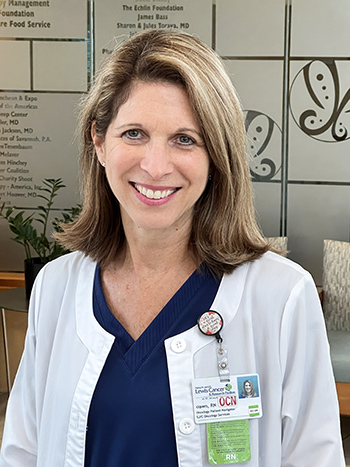
Spotlight on oncology nurse navigator Dawn Williams
Dawn Williams
Oncology Nurse Navigator (assisting GI, GU and CNS patients)
Lewis Cancer & Research Pavilion
Nursing for 15 years; two year in her current role at the LCRP

SJ/C: Why did you decide to become a nurse?
Dawn: Right out of high school, I would have never imagined I would become a nurse because I didn’t like blood and all that. But, I loved taking care of people. I homeschooled my kids for seven years when I was a stay-at-home mom, and my plan was when they go to school, I was going to go to college. But, I wasn’t really sure what I wanted to be. Anytime someone was sick in the family, they’d call me. My in-laws had gotten me these Reader’s Digest medical books. Literally, I had read these books so much that the covers were falling off of them. I loved learning about medical stuff, and I loved helping my family. That’s when I thought why not make a career out of something I love.
SJ/C: Why did you choose St. Joseph’s/Candler?
Dawn: I was at Hospice for six years. During that time, my daughter was in nursing school at Armstrong, and she had done clinicals at Summit Cancer Care. She knew I wanted a change, so I applied there and got hired by Summit in their treatment room as an infusion nurse. Then we joined St. Joseph’s/Candler and came over to the LCRP. That’s how I ended up here, and it’s the best thing to ever happen to me. I was an infusion nurse for six years before I became an oncology nurse navigator.
SJ/C: What are some of your responsibilities as an oncology nurse navigator?
Dawn: The biggest thing about an oncology nurse navigator is helping the patients with whatever they need. The best way I know how to describe it is helping decrease their anxiety that may come with all the new terminology they hear, the overall disease process and the treatment plan. We provide resources to read, emotional support and help them keep up with their appointments and schedules. We also make referrals to the other disciplines that are available to them, such as social work, financial navigators and dietitians. There is a whole team available to them to help assist them on their journey. I like to remind them that we are their cheerleaders.
Not everyone needs a navigator, but for those that do, there’s such a joy in helping them get through all this and onto survivorship. There are some that are done with treatment, yet they will still call me. There are some that come in for a follow-up and call to let me know, or I’ll see them in the lobby. It’s like a friendship for life.
Another thing we do is ED referrals. If somebody goes to the hospital and a mass shows up on a scan, the ED physician will refer them to a specialty doctor or a primary care doctor for surveillance, but they also refer them to us navigators. We make sure that they are followed up. We would not want patients to fall through the cracks.
SJ/C: Do you find that patients are surprised we have this role?
Dawn: I don’t know if there is so much surprise as appreciation. A lot of times they are scared. They’ve heard it’s cancer. I think a lot of times they don’t expect to have someone who will walk them through their cancer journey, and they are appreciative of that.
SJ/C: What do you love about your job?
Dawn: Getting to know the patients is the best part of what I do. Having started my nursing career in oncology at the bedside, working at hospice and being an infusion nurse, this job as a navigator is a way to use all of my experience to help others. Also, when you deal with patients fighting for their lives on a daily basis, you realize what a blessing life is. It makes you less likely to take life, health and loved ones for granted.
SJ/C: Are there challenges that come with the role of working with cancer patients?
Dawn: The hardest thing is when patients come in to say goodbye. The treatment is no longer working, and they come to let you know. The hugs are tearful and heartfelt. Heaven is going to be a sweet reunion.
SJ/C: What advice would you give to new nurses or those considering a career in nursing, especially in the oncology field?
Dawn: I would say that if working in oncology is pulling at your heart strings, go with it. God has been so faithful to give grace and strength. It truly is the most rewarding career path – not easy, but so worth it!
Family: Husband, Mark; son, Darrell (Lacy), daughters, Lauren (James) and Meagan (Will); two grandkids (Caden, 6, and Layne, 3)
